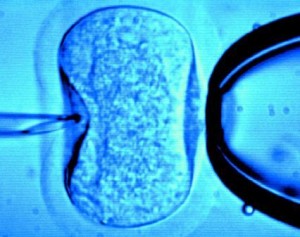 Embryos are regularly being destroyed by IVF clinics for minor disorders suffered by individuals as successful as Charles de Gaulle and Pete Sampras.
Embryos are regularly being destroyed by IVF clinics for minor disorders suffered by individuals as successful as Charles de Gaulle and Pete Sampras.
The Human Fertilisation and Embryology Authority, the government fertility watchdog, has drawn up a list of more than 100 inherited conditions which clinics can screen out without special permission.
While some of the conditions on the list can result on deformity, severe pain and premature death, others are simply minor conditions which do not prevent sufferers leading a happy life.
The exemption list was lambasted by pro-life campaigners who said it was wrong to dispose of a life just because it was not perfect in every way.
David King, director of Human Genetics Alert, said: ‘It contributes to a social climate in which even minor deviations from “normality” are seen as unacceptable.’
The HFEA’s list of conditions takes into account various factors including the age of onset and the variability of symptoms, if there is an existing treatment, and how invasive it is.
The list includes minor illnesses such as the blood disorder thalassemia, a condition which can case mild anaemia. Thalassemia has not however stopped tennis player Pete Sampras winning Wimbledon seven times.
Another condition on the list is Marfan’s syndrome, a genetic condition that can lead to abnormal growth.
Famous sufferers include US civil war president Abraham Lincoln and Charles de Gaulle, leader of the Free French during the war.
Under HFEA rules, parents with genetic conditions are allowed to avoid passing it onto their children by using pre-implantation genetic diagnosis (PGD).
Cells are removed from an embryo after eight days. The cells are put through PGD and embryos found to be carrying the defects are destroyed, while healthy ones are kept.
On top of the 116 conditions on the HFEA list, the association is considering adding a further 24, including porphyria.
This hormonal condition is believed to have caused the madness of King George III and some believe it has been passed down to other members of the Royal Family.
Karen Harris, from the British Porphyria Association, said she could understand why some parents might use PGD, although she would never have used it on her own children.
‘If you have lived with someone unable to function and on constant morphine because of the pain, you would take a different view,’ she said.
This entry was posted
on Tuesday, January 26th, 2010 at 3:09 pm and is filed under IVF, News & Commentary, Pro-life issues.
You can follow any responses to this entry through the RSS 2.0 feed.
Responses are currently closed, but you can trackback from your own site.
IVF clinics destroying embryos with minor genetic disorders
The Human Fertilisation and Embryology Authority, the government fertility watchdog, has drawn up a list of more than 100 inherited conditions which clinics can screen out without special permission.
While some of the conditions on the list can result on deformity, severe pain and premature death, others are simply minor conditions which do not prevent sufferers leading a happy life.
The exemption list was lambasted by pro-life campaigners who said it was wrong to dispose of a life just because it was not perfect in every way.
David King, director of Human Genetics Alert, said: ‘It contributes to a social climate in which even minor deviations from “normality” are seen as unacceptable.’
The HFEA’s list of conditions takes into account various factors including the age of onset and the variability of symptoms, if there is an existing treatment, and how invasive it is.
The list includes minor illnesses such as the blood disorder thalassemia, a condition which can case mild anaemia. Thalassemia has not however stopped tennis player Pete Sampras winning Wimbledon seven times.
Another condition on the list is Marfan’s syndrome, a genetic condition that can lead to abnormal growth.
Famous sufferers include US civil war president Abraham Lincoln and Charles de Gaulle, leader of the Free French during the war.
Under HFEA rules, parents with genetic conditions are allowed to avoid passing it onto their children by using pre-implantation genetic diagnosis (PGD).
Cells are removed from an embryo after eight days. The cells are put through PGD and embryos found to be carrying the defects are destroyed, while healthy ones are kept.
On top of the 116 conditions on the HFEA list, the association is considering adding a further 24, including porphyria.
This hormonal condition is believed to have caused the madness of King George III and some believe it has been passed down to other members of the Royal Family.
Karen Harris, from the British Porphyria Association, said she could understand why some parents might use PGD, although she would never have used it on her own children.
‘If you have lived with someone unable to function and on constant morphine because of the pain, you would take a different view,’ she said.
This entry was posted on Tuesday, January 26th, 2010 at 3:09 pm and is filed under IVF, News & Commentary, Pro-life issues. You can follow any responses to this entry through the RSS 2.0 feed. Responses are currently closed, but you can trackback from your own site.